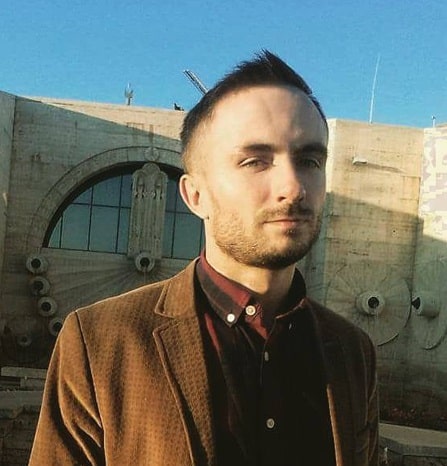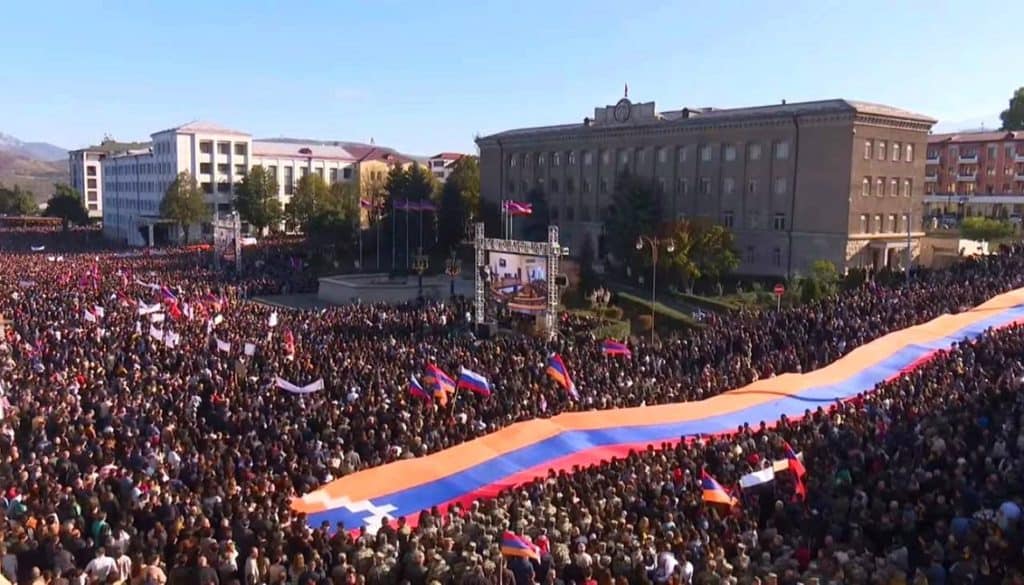By Anton Evstratov
The Armenian republics of Armenia and Artsakh end 2022 in an extremely alarming situation. Azerbaijan’s blockade of unrecognized Artsakh and the abundance of political problems in Yerevan against the backdrop of the Russian Federation’s lack of attention to the region almost call into question the security and very existence of both states.

The blockade of Artsakh by Azerbaijani “environmentalists,” among whom were identified almost immediately some officers of Azerbaijan’s armed forces and security services, as well as employees of pro-government NGOs and personally associated with the Aliyev family, threatened not only the supply of 120,000 people in the unrecognized republic with goods, including basic necessities, but also its gas supply in the winter period for several days.
The Lachin corridor blocked by Azerbaijanis is currently the only logistic artery linking Armenia and the Republic of Artsakh (Nagorno-Karabakh). Considering that after the war in 2020 a significant part of agricultural land and manufacturing industry of the unrecognized state was lost, the issue of supply from the territory of Armenia and connection with the outside world through it is critical for Artsakh and its population.
And, despite the fact that gas is currently supplied to the unrecognized republic, the problem of functioning of the Lachin corridor is still not resolved, and the blockade continues.
This event, on the one hand, has raised new questions about the relationship between Yerevan and Stepanakert, but, on the other hand, has once again made some parts of Armenian society question the activities of Russian peacekeepers.
Armenia’s top leadership has long been silent about what is happening in the Lachin corridor (with members of the National Assembly from the ruling party openly shifting responsibility for what is happening to Russia, denying responsibility from Yerevan), or limited itself to routine statements, but a week ago it initiated a convening of the UN Security Council, where, through its representative in the organization, it put the necessary accents.
It should be noted that it was the aforementioned UN meeting that also clarified the international picture regarding the blockade of the Armenia-Artsakh corridor – the Security Council members were unanimous in calling for the immediate opening of the artery, and only the Azerbaijani and Turkish representatives refused to recognize the blockade as such.
As for the activity of the peacekeepers, the society is set against them by their inability to remove the tents of the Azerbaijani “environmentalists” from the “road of life”, by their cordoning off around these tents, and by some statements of certain servicemen of the PKK. Particularly resonant was a video in which Azerbaijani “environmentalists” captured a dialogue between one of them and a Russian peacekeeper, during which the latter states: “it’s good that Karabakh is Azerbaijan”.
It is not surprising that, for example, the rally on December 24 was aimed precisely at influencing the peacekeepers and their commanders. However, Russia and its peacekeeping contingent still retain a resource of influence among the population of Artsakh and Armenia because of Moscow’s ability to “take over” the region after the end of the Ukrainian special operation. This has been repeatedly stated by a number of Russian experts, and it has also been stated several times by RMK representatives during talks with the Artsakh public. These talks, among other things, also revealed a generally negative attitude of the Russian peacekeepers’ command to the actions of the Azerbaijani “environmentalists”, the awareness of their provocative nature.
The unanimous condemnation of Azerbaijan by the world community makes the Azerbaijani leadership look for new ways to put pressure on the Armenian side. This explains the recent discourse on Baku’s intention to return eight enclaves – allegedly Azerbaijani villages, left on the territory of Armenia after 1991. Ilham Aliyev personally announced this problem, understanding the formal admissibility of his demands in the light of the recognized postulate of the absence of a delimitation between RA and AR (In fact, this delimitation has de facto and de jure occurred. As early as 1991, when joining the UN and the CIS, Yerevan and Baku mutually recognized their borders, but no delimitation was made).
Such activity of Baku can be explained by the desire to achieve maximum concessions not only from Armenia but also from Russia, taking into account its involvement in the Ukrainian special operation and the desire to ensure the loyalty of Baku and Ankara in its course. This largely explains Moscow’s indecisive actions, both on the peacekeeping line and in other aspects. For example, neither the Russian Federation, nor the CSTO, which it is guided by, condemned the invasion of Azerbaijani troops into Armenia in September 2022, and even during the above-mentioned UN Security Council meeting the position of Russia was the most loyal to Baku of all the countries supporting Armenia (only Russian diplomats mentioned the requirement of Azerbaijan on access, allegedly, of environmentalists to gold and copper mines of Artsakh).
It is noteworthy that one of the goals of the Azerbaijani “environmentalists” was to ensure Baku’s control over the Kashen copper-molybdenum mine, which Azerbaijan had earlier transferred to the British Anglo Asian Mining Company. At the moment, however, the mine, located in the Martakert district, is controlled by the government of the Republic of Artsakh and is operated by the Armenian company Base Metal. At the same time, Britain in the UN Security Council also called for the immediate opening of the Lachin corridor, which indicates at least London’s unwillingness to act in this matter by its own hands.
At the same time, we should not forget about the issue of the Zangezur corridor, which is still the target of Azerbaijani diplomacy and military policy in the region. It is this corridor that Baku is trying to “change” to the Lachin corridor, and even faced with international condemnation, it will obviously resume its attempts in other planes and spheres.
The current chance for Azerbaijan is the relative, even if perhaps temporary, loyalty of Russia to it in this matter. Armenia, in turn, has the unequivocal support of Iran, with the indifference (also probably temporary) of Western countries. Tehran does not only benefit from the prospect of the Zangezur corridor cutting itself off from Armenia but also from the emergence of an arc of two Pan-Turkic states metaphysically hostile to Iranian statehood.
The fall opening of the consulate of the Islamic Republic in the city of Kapan was subordinated to this. Moreover, a number of Iranian experts and even officials have repeatedly stated that over the past two years Iran has been preventing Azerbaijan and Turkey from opening the aforementioned corridor. In this regard, we can conclude that the recent deterioration of relations between Tehran and Baku is largely due to Armenia and its sovereignty over its own transport routes.
The Armenian-Azerbaijani peace treaty will apparently not end in 2022, contrary to the promises of both sides. Recall that earlier the actors of the possible agreement declared their intention to achieve it by the end of the current annual period. None of the previous obstacles have been eliminated so far – neither in logistical, nor in military-political spheres. At the same time, it is impossible not to note the obvious toughening of the position of Yerevan. Thus, the Armenian Prime Minister Nikol Pashinyan, speaking at a government session, announced that Armenia had presented its proposals regarding the terms of the treaty and was ready to sign it only on their basis.
The appointment of Ruben Vardanyan as Artsakh’s state minister is also an undoubted result of 2022. Despite the fact that Vardanian has been in his post since November, versions about the nature, motives and expectations of his appointment still emerge. According to the most common one, Vardanian, a major Russian businessman, is a Kremlin protégé. Another one says that being a personal friend of the former and current heads of Artsakh – Baku Sahakyan and Araik Harutyunyan, the new state minister was appointed without consulting Moscow and Yerevan. The third version points to Vardanian’s ties with British business, calling him nothing less than “England’s protégé. Presently, it is impossible to seriously discuss either of these or other points of view.
Much in Armenia and Artsakh will depend on the results of the meeting of the leaders of Russia, Armenia and Azerbaijan in St. Petersburg, but we cannot speak of the elimination of all contradictions in the “northern capital” of Russia. Having the technical possibility to block the Lachin corridor and free hands in the political plane, Baku will continue to put pressure on Yerevan and Stepanakert, which, in turn, will count on international support, Iran’s position and the actions of Russian peacekeepers and military-political leadership. Given the problematic and ambiguous nature of each of the aforementioned possibilities, we can assume a difficult year of 2023 for both Armenia and Artsakh, both at the level of political elites and at the level of societies.
Author: Anton Evstratov (Russian historian, journalist and journalist living in Armenia, lecturer at the Department of General History and Foreign Regional Studies at the Russian-Armenian University in Yerevan).
(The opinions expressed in this article are solely those of the author and do not necessarily reflect the views of World Geostrategic Insights)







